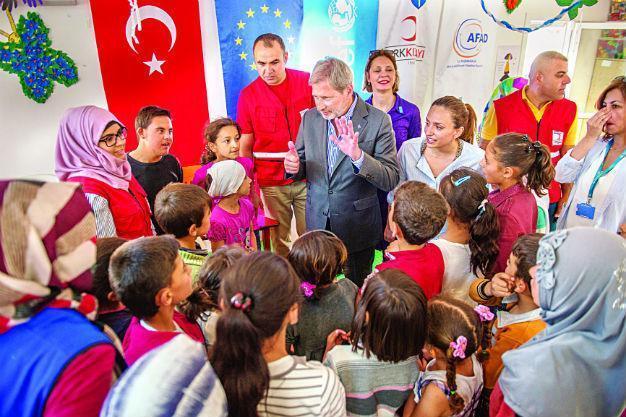EU calls on Turkey for ‘focused efforts’ on integration of Syrian refugees
Emine Kart – ŞANLIURFA

AA photo
In a clear acknowledgment of the generations-long and multi-layered impact of the presence of millions of Syrian refugees in Turkey, the EU’s executive arm has urged Ankara to concentrate its efforts on measures to help better integrate Syrians into Turkish society.During a visit to southeastern border province of Şanlıurfa on April 26, EU Commissioner for Enlargement Johannes Hahn underlined that after five years of conflict in Turkey’s neighbor, it is time for Ankara to focus on schooling Syrian children and improving the Turkish language skills of Syrian refugees regardless of their age.
“When there is peace, there is opportunity for prosperity. Prosperity means jobs and perspectives. Prosperity gives people a hope to stay in their region,” Hahn told reporters during a visit to a refugee camp managed by Turkey’s Disaster and Emergency Management Authority (AFAD) in Harran, Şanlıurfa.
He repeatedly voiced “gratitude” for what the Turkish authorities have done over the past five years, placing particular emphasis on AFAD.
“For us, the European Union believes that stability is the overarching goal in the region for people coping with the refugee crisis. But we also understand that refugees are a huge opportunity, an opportunity to understand each other better, to work together, to create relationships,” Hahn said.
“And if we are investing primarily in schooling, secondly it is important that we also provide necessary financial assistance for teaching the Turkish language. It is very important that language skills are available,” he added.
Praising the Turkish government for taking the initiative to grant Syrian refugees work permits, Hahn said the opportunities had still not been fully taken.
“We saw that this opportunity has not yet been really fully exploited because of the lack of language skills. But we also witnessed during a previous Gaziantep visit a couple of weeks ago that there is still a cross-border relation between Syria and Turkey, and this is something you can build on,” the EU commissioner said.
Referring to their meeting with Turkish government officials in Istanbul earlier this week, Hahn said they also discussed the prospects of offering Syrians the chance to start setting up their own jobs in Turkey.
“We are talking about an investment, an investment in people, an investment in the region, opportunities, peace and reconciliation, and finally it is about stability. What I have seen here, like in other camps, is a really excellent example of how management of such a big influx of refugees in a proper way. I hope you will be able to remove this camp as soon as possible, because we all hope a peace will be brought about in Syria. But it is also useful to use the opportunity to integrate at least those who have already declared that they intend to stay in the country because they see opportunities here. They should be seen as an added value, an asset,” Hahn added.
Syrian refugee children sing songs
During Hahn’s visit to the Harran Camp, Syrian children gave traditional folklore performances and sang songs. A band of girls and boys playing the Turkish “bağlama” instrument sung a song originally from southeast Anatolia, singing in Arabic, English, Kurdish and Turkish, with original lyrics changed.
“Janei, janei, janei/Come on darling this way/Dance with me and stay/Don’t leave me halfway,” say the words of the song’s chorus. “Dance for revolution/Sing for liberation/Death to occupation/Long live our nation.”
















